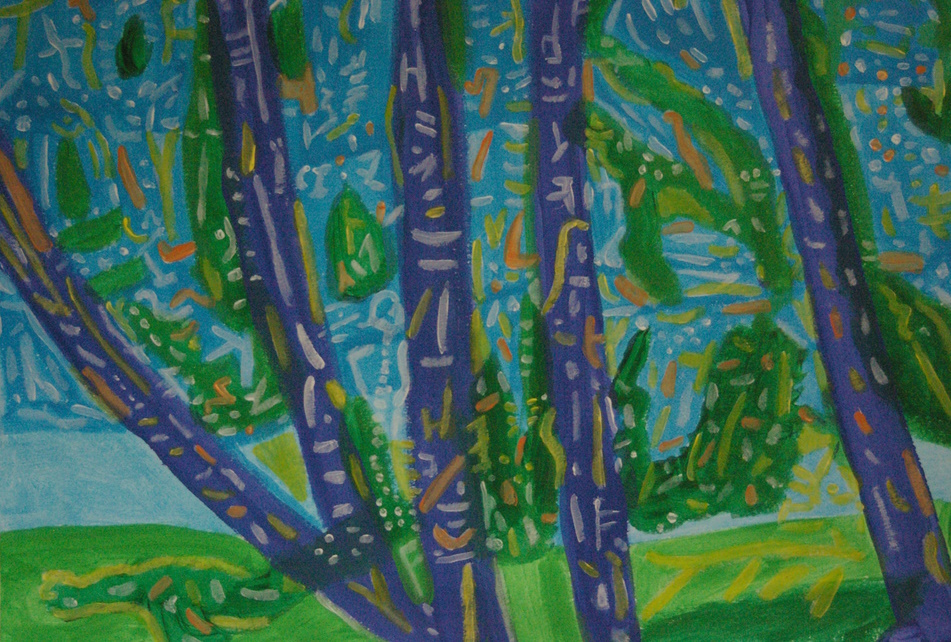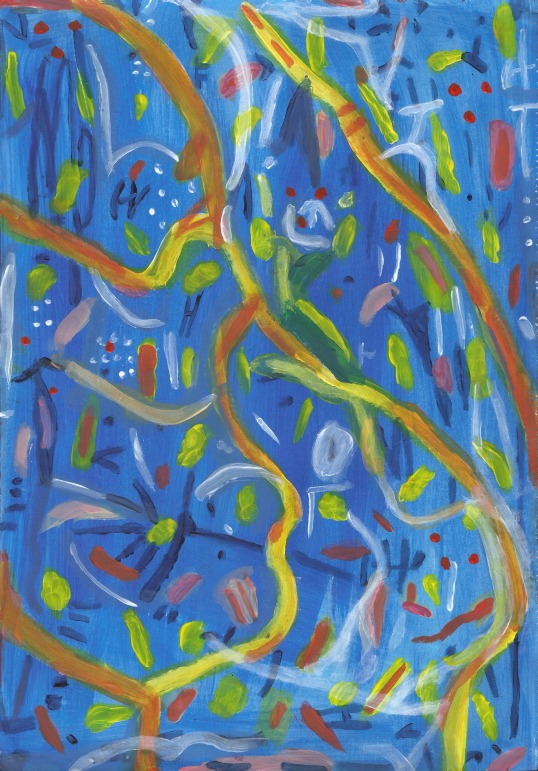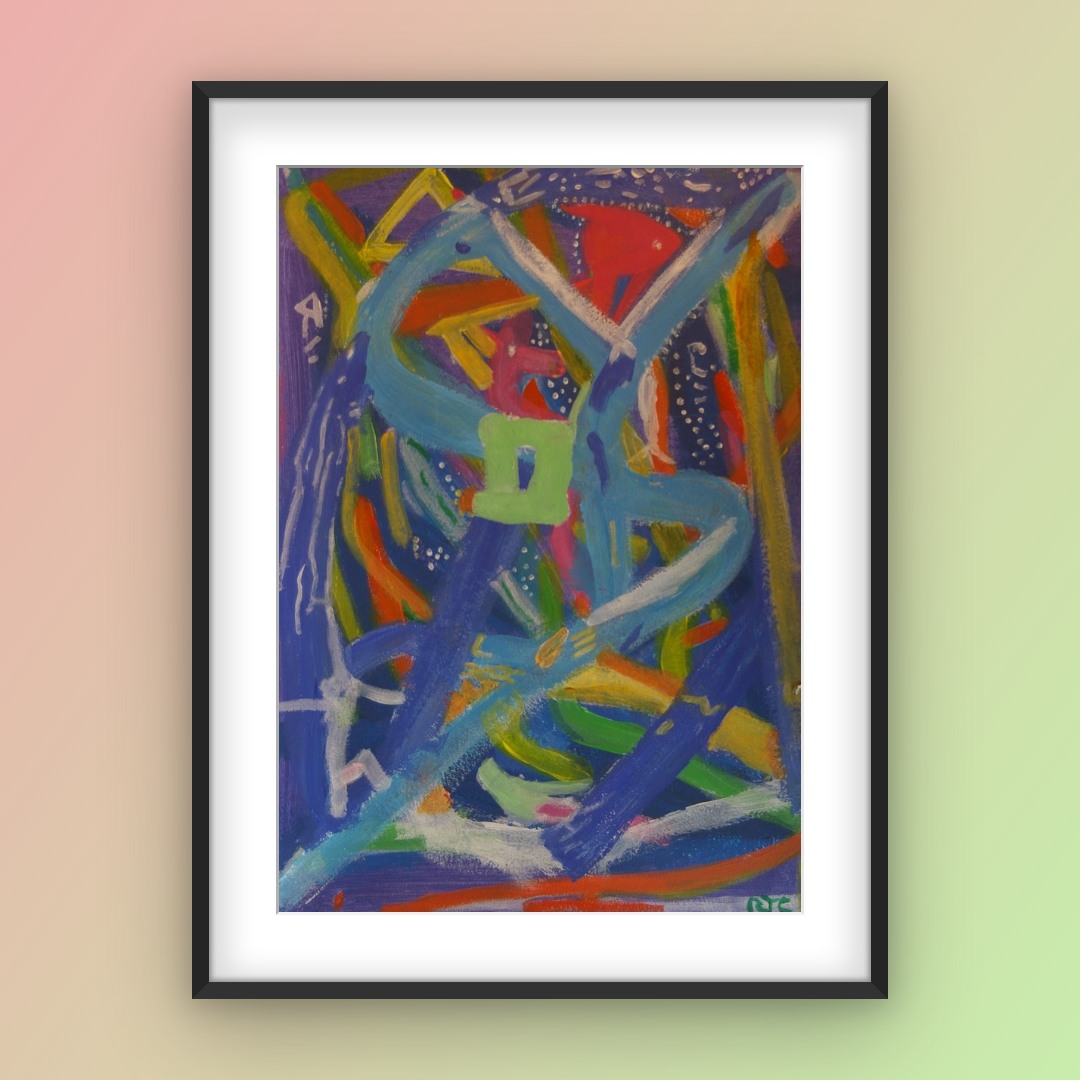'This is the direct path for the purification of beings. For the overcoming of sorrow and lamentation. The disappearance of pain and grief. And the realisation of nibanna.
Namely the four foundations of mindfulness.' - the Buddha
Foundation number one: Mindfulness of the body
- Awareness of the four postures: walking, standing, sitting, and lying down.
.. - Mindfulness of breathing. (anapana-sati)
.. - Sati-sampajanna. Awareness of the present moment. Knowing where one is. What one is doing. One's behaviour, of that which is appropriate, that which is non-delusion.
.. - Reflection on the 32 parts of the body:
Head hair, Body hair, Nails, Teeth, Skin
Flesh, Sinews, Bones, Bone Marrow, Kidneys
Heart, Liver, Diaphragm, Spleen, Lungs
Large Intestines, Small Intestines, Stomach, Faeces, Brain
Bile, Phlegm, Pus, Blood, Sweat, Fat
Tears, Grease, Saliva, Mucus, Oil of the Joints, Urine
.. - Analysis of the four elements: earth, water, fire, air. (Both within the body and outside the body.)
.. - The cemetery contemplations and marana-sati (mindfulness of death).
Foundation number two: Mindfulness of feelings
1. Mindfulness of pleasant feelings, mindfulness of neutral feelings, mindfulness of unpleasant feelings. Awareness of them both within oneself and within others.
2. Mindfulness of pleasant wordly feelings, neutral worldly feelings, unpleasant wordly feelings. Both within oneself and within others. I find contemplation of the eight worldly winds can be helpful here:
pain and pleasure,
gain and loss,
success and failure,
praise and blame.
3. Mindfulness of pleasant spiritual feelings, neutral spiritual feelings, and unpleasant spiritual feelings. Both within oneself and others. This is to do with the spiritual path and its fruits.
Awareness of the rising, flowing, and fading away of feelings.
Foundation number three: Mindfulness of the mind
Knowing when the mind is:
Greedy or not
Lustful or not
Angry or not
Hateful or not
Conceited or not
Selfish or not
Deluded or not
Confused or clear
Collected or scattered
Expansive or contracted
Developed or undeveloped
Meditating or not
In samhadi or not
Liberated or not
Awareness of the rising, flowing, and disappearance of these states of mind.
Foundation number four: Mindfulness of dhammas
1. The five hindrances to samhadi:
1. Longing, 2. aversion, 3. stagnation, 4. agitation, 5. doubt.
Awareness of the manifestation, origination, and disappearance of the five hindrances.
'And when one knows that these five hindrances have left the mind. Gladness arises, and from gladness comes delight, from delight one's body becomes tranquil, and with a tranquil body one feels happy.
And with happiness one's mind easily enters samhadi. And being thus detached from unwholesome states of mind one enters and remains in the first jhana...' - the Buddha (D. 2:75)
2. The five aggregates of clinging:
Identifying with the body.
Identifying with feelings.
Identifying with perceptions and memory.
Identifying with mental formations.
Identifying with consciousness.
Awareness of the manifestation, arising, and dissolution of the five aggregates of clinging.
3. The six external and six internal sense bases:
1. Eye and visual objects.
2. Ear and sounds.
3. Nose and smells.
4. Tongue and tastes.
5. Body and tangible objects.
6. Mind and mental objects.
Knowledge of them, of their arising, and the letting go of them. And through not clinging to them, the future non-arising of the fetters that originate dependent on both.
4. The seven factors of enlightenment:
Mindfulness -> Investigation of dhammas -> Energy (right effort) -> Joy -> Calm (serenity) -> Samhadi (deep stillness) -> Equanimity.
Knowledge of their presence, their arising, and their development.
5. The four noble truths
1. Knowledge of suffering (which is to be understood)
Old age, sickness and death is suffering.
Separation from those we love is suffering.
Identifying with the body, feelings, perceptions, memories, thoughts, ideas, moods/emotions, and consciousness is suffering.
Feeling regret and remorse for past actions is suffering.
Not getting what one wants is suffering.
Depression and fatigue is suffering.
Taking things personally is suffering.
and so on...
In short, clinging to and identifying with changing (impermanent) phenomena that is outside our control, is suffering. We are all fated to become separated from what we love and hold dear. None of us have the power to stop that. Everything is transient.
2. Knowledge of the cause of suffering (which is to be abandoned)
The three aspects of craving are the cause of suffering. The Buddha describes them as:
1. craving for sense-pleasures (kama-tanha), which feeds the defilement of greed.
2. craving for non-existence (vibhava-tanha), wishing for things to be different, wishing for something not to be, not to exist. This feeds the defilement of hate or aversion.
3. craving for existence (bhava-tanha). Feeds the defilement of delusion.
(N.b. Tanha is a Pali word often translated as either craving, thirst or desire.)
(N.b. II - The five links at the centre of dependent origination can be helpful to keep in mind here: .. sense impressions -> feelings -> craving -> clinging/identifying -> becoming ...)
When one has seen the sign of anicca (change and impermanence) at a deep level. It is hard to un-see it. It has a profound change on one. Wherever one looks, one sees the transient nature of things, and starts to naturally become disillusioned with materiality; and not as caught up by the things of the world anymore. One sees through it. Sometimes from bitter painful experience, by making poor choices and having to live with the results, which is part of learning too. Don't beat yourself up for that, we all do it. We all make mistakes. Sometimes we learn our greatest lessons from failure.
As one gets less ignorant and wises up, one stops clinging to things, realising it is changing phenomena that is outside one's control. And then the craving starts to fade.
And with non-attachment, letting things be, letting them go, cessation occurs.
3. Knowledge of the end of suffering (which is to be realised)
Lasting peace of mind and contentment. Freedom from suffering. The realisation of nibanna, the deathless. The happiness of no longer being driven around and harassed by the defilements: greed, aversion, and delusion. This stopping, this ceasing of tanha brings relief, and frees the mind of stress and sorrow.
The mind in its un-harassed original state is luminous, radiant like the sun coming out from the behind the clouds. (The clouds in this metaphor being greed, hate, and delusion.)
4. Knowledge of the way that leads to the end of suffering (Which is to be developed)
This is the noble eightfold path. The way that leads to the cessation of suffering. All the path factors are important. Leaving any of them out is like leaving out an important component of a motor vehicle, it won't start or be able to reach its destination if any are missing. All these parts need to work together in harmony.
1. Right view: in brief, mundane right view is knowing that good karma comes from thoughts, words, and actions of giving, kindness, and clear-seeing.
And bad karma comes from thoughts, words, and actions of greed, hate, and delusion.
Supra-mundane right view is the four noble truths. It's called supramundane because it is what leads to the four classical stages of enlightenment.
2. Right intention: Non ill-will, non-greed, non-cruelty. (The practise and cultivation of the brahma-viharas (The sublime abidings) is helpful here.)
3. Right speech: to speak truthfully, to avoid malicious and divisive speech, to refrain from harsh unkind speech, and to refrain from idle pointless speech.
4. Right action: To refrain from taking the life of any living creature. To refrain from taking that which is not given. To refrain from sexual misconduct.
5. Right livelihood: Having abandoned wrong livelihood. One continues to make one's living with right livelihood. This is an occupation or lifestyle that does not cause harm to one self or others.
6. Right effort:
In the words of the Buddha:
1. One generates the desire for the prevention of unwholesome states of mind by making effort, rousing energy, exerting one's mind, and striving.
2. One generates the desire for the abandonment of unwholesome states of mind by making effort, rousing energy, exerting one's mind, and striving.
3. One generates the desire for the arising of wholesome states of mind. By making effort, rousing energy, exerting one's mind, and striving.
4. One generates the desire for the continuance, non-disappearance, strengthening, increase, and full development of wholesome states of mind. By making effort, rousing energy, exerting one's mind and striving.
Right effort is also about tuning the energy of effort and attention so it is niether too tight, nor too loose. One has to experiment and find a sweet spot that works just right. It is like tuning a musical instrument, when you get it in tune it makes sweet music and there is progress and flow.
7. Right mindfulness:
This is the four foundations of mindfulness.
Having removed longing and dejection in regard to the world.
1. One abides contemplating the body as a body, ardent, clearly-comprehending (knowing), and mindful.
2. One abides contemplating feelings as feelings, ardent, clearly-comprehending, and mindful.
3. One abides contemplating mind, as mind, ardent, clearly-comprehending and mindful.
4. One abides contemplating dhammas as dhammas. Ardent, clearly-comprehending and mindful.
8. Right samhadi:
This is defined by the Buddha as the four jhanas. Four deep states of meditative absorption. The joy and pleasure described in the verses is a whole body experience. It is the feeling of the inner body.
1. First jhana: Quite secluded from the world, secluded from unwholesome states of mind (the five hindrances). One enters and remains in the first jhana. Which is accompanied by applied and sustained thought (or attention). And has the joy and pleasure born of seclusion (from the five hindrances).
(There is a bit of a wobble in the first jhana, as one keeps applying and sustaining attention to the meditation object. But after a time there comes a point when the attention becomes stable and centred with the object, then it becomes effortless. One can let go of the applied and sustained attention then, take off the stabilizers and just flow with the momentum as a mindful passenger. Mindfulness is what leads to the jhanas and remains present throughout them all.)
2. Second jhana: With the subsiding of applied and sustained thought. One enters and abides in the second jhana. Which is accompanied by self-confidence and unification of mind (deep composure). Is without applied and sustained thought and has the joy and pleasure born of samhadi.
3. Third jhana: With the fading away of joy. One abides in equanimity. And mindful, clearly-comprehending, still feeling pleasure in the body. One enters and abides in the third jhana. On account of which the nobles one say: 'One has a pleasant abiding, who has equanimity and is mindful.
4. Fourth jhana: With the dissolving of pain and pleasure, and the previous disappearance of sadness and joy. One enters and abides in the fourth jhana. Which has neither pleasure nor pain. And has mindfulness purified and born of equanimity.
Hopefully I haven't got any of that wrong. I am going from memory. This is something I chant to myself every now and then to remember the practise, it is an evolving chant, that changes and grows as I learn more.
But I find it helpful to go over what I have learnt like this. It can also help bring some faith, courage, energy and determination when I feel disheartened, or lack the motivation to practise.
After some lengthy chanting like this, it can feel easier to settle into meditation. It is a bit like sweeping the floor of the mind to make it more inclined towards samhadi.



